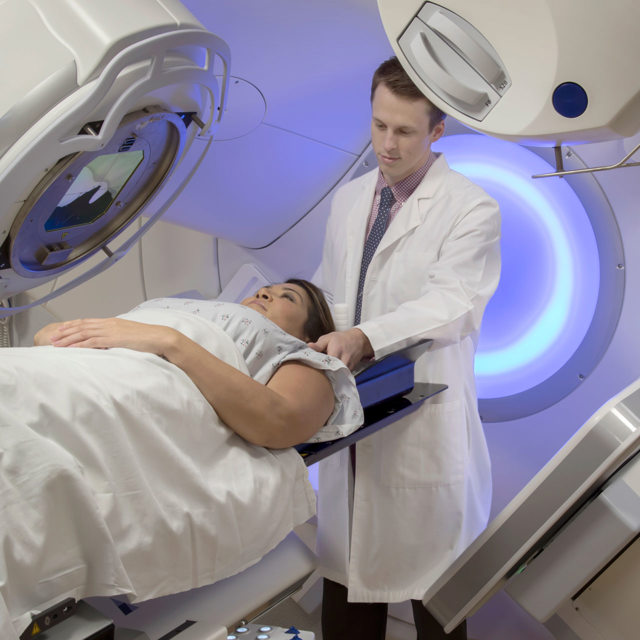
Bladder Cancer Treatment
Understanding Bladder Cancer Symptoms and Bladder Cancer Treatment Options.
Penn Highlands offers a specialized team of urologists and oncologists who work together to provide a precise bladder cancer diagnosis and create a customized bladder cancer treatment plan to help you achieve optimal results. Most cases of bladder cancer occur in people over age 55, but bladder cancer can be missed because there is no standard screening unless you start experiencing bladder cancer symptoms. If you are diagnosed with bladder cancer and live in central, northwestern or southwestern Pennsylvania and need expert bladder cancer care, you can find it close to home with Penn Highlands board-certified urologists and expert cancer care teams.
How is Bladder Cancer Diagnosed?
Routine bladder cancer screening isn’t recommended for people who are not considered at risk of developing the disease. Bladder cancer is the fourth most common cancer in men and is less common in women. Your doctor may test you for bladder cancer if you’re at very high risk because you’ve had bladder cancer before, if you were born with certain birth defects of the bladder, or if you are exposed to certain chemicals at work.
Most cases of bladder cancer are diagnosed after bladder cancer symptoms develop. Bladder cancer signs and symptoms are similar to the symptoms of many types of infections or other conditions, including:
- Blood in the urine
- Need to urinate more frequently than usual
- Painful urination
If infections or other bladder/urinary tract conditions are ruled out, these symptoms could be early warning signs that help detect bladder cancer early while it is easier to treat.
To evaluate bladder cancer symptoms, a urine sample can be checked under a microscope to look for cancer cells. This is called urine cytology. Another diagnostic test, called a cystoscopy, is performed by the urologist inserting a thin, lighted tube into the bladder to check for abnormal cells that may need to be biopsied.
When cancer cells are only present in the lining of the bladder, it is called superficial bladder cancer. With invasive bladder cancer, it has grown into the wall of the bladder or to nearby organs and/or lymph nodes.

Urology
Penn Highlands Urology - DuBoisA Service of Penn Highlands DuBois

Urology
Penn Highlands Urology - DuBoisA Service of Penn Highlands DuBois

Urology
Penn Highlands Urology - ClearfieldA Service of Penn Highlands DuBois
Penn Highlands Urology - DuBoisA Service of Penn Highlands DuBois

Urology
Penn Highlands Urology - ClearfieldA Service of Penn Highlands DuBois
Penn Highlands Urology - DuBoisA Service of Penn Highlands DuBois

Urology
Penn Highlands Urology - DuBoisA Service of Penn Highlands DuBois
What are the Treatment Options for Bladder Cancer?
If you are diagnosed with bladder cancer, you’ll usually be referred to a urologist who specializes in cancer, called a urologic oncologist. Penn Highlands has experienced urologic oncologists who will explain your cancer diagnosis. This expert physician will talk with you about treatment options and develop a customized plan that is based on the size and possible spread of the cancer, your age, your overall health, and your treatment preferences.
Bladder cancer treatments include surgery, radiation therapy, chemotherapy, immunotherapy, targeted therapy, or some combination of these. A urologic surgeon will perform the surgery and then will work with oncology doctors to provide the other types of care.
Surgery may be done to remove the tumor or the entire bladder, depending on how far the cancer has spread. Sometimes, chemotherapy or immunotherapy is delivered through intravesical therapy. This means a liquid drug is delivered directly to the bladder by catheter rather than being taken orally or through the bloodstream.
Robotic Bladder Cancer Surgery
Surgery is the main treatment for bladder cancer that has invaded the wall of the tumor. Penn Highlands urologic oncologists are also surgeons who are highly skilled and experienced in this type of surgery called cystectomy. They perform the most sophisticated type of cystectomy using the da Vinci robot to remove part or all of the bladder, based on the size of the tumor. The robotic surgery system gives the surgeons enhanced vision, control and precision, allowing them to perform the procedure must faster through small incisions. The benefits to patients include:
- Less blood loss
- Less pain
- Quicker recovery
- Less scarring
If a patient has a low-grade tumor that has invaded the wall of the bladder but is limited to one area, the urologic surgeon may remove only that part of the bladder. Because only part is removed, patients typically are able to urinate normally after recovery.
If the tumor involves the muscular layer of the bladder, the entire bladder may need to be removed. This is called a radical cystectomy. When the entire bladder is removed, the urologic surgeon must perform a procedure that allows the body to store and pass urine. One newer way to do that is called an intracorporal diversion. After removing the bladder, the urologic surgeon creates a tube, called a conduit, using a piece of the patient’s small intestine. The surgeon then connects the ureters that were previously connected to the bladder to the conduit and runs the conduit through a small hole in the abdomen to drain into a pouch worn outside the body but under the clothes.
Penn Highlands urologic surgeons were the first in western Pennsylvania to perform a robotic cystectomy with intracorporal diversion. The benefits of this procedure, according to a medical study, include:
- Decreased blood loss
- Faster return of bowel function
- Shorter hospital stay
Read more about the use of robotic-assisted cystectomy.
Who will be on my Bladder Cancer Care Team?
At Penn Highlands, you have a whole team of people to support you throughout your bladder cancer treatment. The dedicated healthcare professionals and support staff involved in your cancer care include:
- Urologists
- Medical and radiation oncologists and therapists to plan and administer the correct types and doses of chemotherapy and radiation therapy
- Oncology nurses
- Support services, including social workers, nutritionists, at home healthcare nurses, mental health providers, spiritual care providers and even van drivers if you need transportation to your treatments
FAQS
What is the Main Cause of Bladder Cancer?
Smoking is the most significant risk factor for bladder cancer, causing about half of cases. Certain chemicals at work also can increase risk.
When you’re exposed to chemicals that could cause cancer, through smoking or work exposure, they are filtered out of your bloodstream by your kidneys into the urine stored in your bladder.
People who drink plenty of fluids tend to get bladder cancer less often, possibly because they empty the bladder more often and reduce the exposure to any chemicals in the urine.
Is Bladder Cancer Curable?
Typically, cancer is not referred to as “cured” but rather as “in remission.” This is because once you have cancer, your chance of recurrence increases. Cancer is now often considered a chronic disease even if you are in remission as you will likely have additional screenings and potentially lifelong treatments.
More than half of people with bladder cancer are diagnosed with superficial cancer that has not spread beyond the inner layer of the bladder wall. This stage has a five-year survival rate of 96%. Even superficial bladder cancer has a higher rate of recurrence than other cancer types, so follow-up testing is important.

